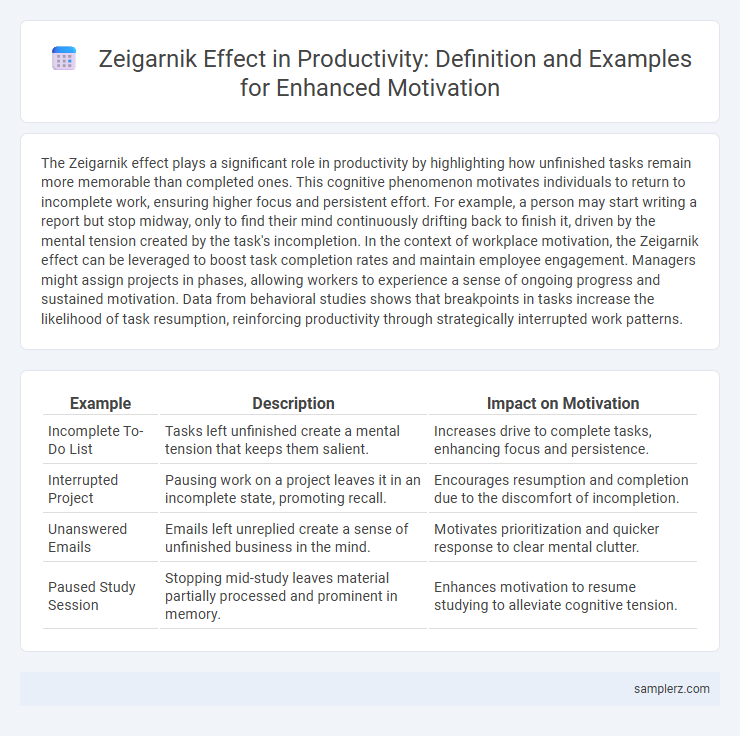The Zeigarnik effect plays a significant role in productivity by highlighting how unfinished tasks remain more memorable than completed ones. This cognitive phenomenon motivates individuals to return to incomplete work, ensuring higher focus and persistent effort. For example, a person may start writing a report but stop midway, only to find their mind continuously drifting back to finish it, driven by the mental tension created by the task's incompletion. In the context of workplace motivation, the Zeigarnik effect can be leveraged to boost task completion rates and maintain employee engagement. Managers might assign projects in phases, allowing workers to experience a sense of ongoing progress and sustained motivation. Data from behavioral studies shows that breakpoints in tasks increase the likelihood of task resumption, reinforcing productivity through strategically interrupted work patterns.
Table of Comparison
| Example | Description | Impact on Motivation |
|---|---|---|
| Incomplete To-Do List | Tasks left unfinished create a mental tension that keeps them salient. | Increases drive to complete tasks, enhancing focus and persistence. |
| Interrupted Project | Pausing work on a project leaves it in an incomplete state, promoting recall. | Encourages resumption and completion due to the discomfort of incompletion. |
| Unanswered Emails | Emails left unreplied create a sense of unfinished business in the mind. | Motivates prioritization and quicker response to clear mental clutter. |
| Paused Study Session | Stopping mid-study leaves material partially processed and prominent in memory. | Enhances motivation to resume studying to alleviate cognitive tension. |
Unfinished Tasks: The Core of the Zeigarnik Effect
Unfinished tasks create cognitive tension that drives motivation and enhances focus, embodying the Zeigarnik effect. This psychological phenomenon shows that incomplete activities remain active in the mind, prompting individuals to prioritize and complete them for mental closure. Leveraging unfinished tasks in productivity strategies leads to increased task engagement and improved workflow efficiency.
The Zeigarnik Effect and Task Initiation in Productivity
The Zeigarnik Effect demonstrates that individuals tend to remember and stay motivated by tasks that are left incomplete, boosting focus and productivity by encouraging task initiation. When a task is started but not finished, cognitive tension creates a mental reminder that drives motivation to complete the task. Leveraging this phenomenon helps enhance productivity by breaking down projects into smaller, actionable steps that keep attention engaged and reduce procrastination.
How Incomplete Goals Fuel Motivation
The Zeigarnik effect reveals how incomplete goals create a mental tension that enhances motivation by keeping tasks active in working memory. This cognitive tension drives individuals to focus on unfinished objectives, boosting productivity until closure is achieved. Leveraging this phenomenon, setting partially completed tasks or breaking projects into smaller steps sustains engagement and encourages continuous progress.
Procrastination vs. Productive Zeigarnik Loops
The Zeigarnik effect explains how unfinished tasks create cognitive tension, driving motivation to complete them and counteracting procrastination. By breaking work into smaller, manageable segments, individuals can trigger productive Zeigarnik loops, which enhance focus and reduce task avoidance. This psychological phenomenon helps maintain sustained attention by leveraging the brain's natural inclination to close open loops, thereby boosting overall productivity.
Leveraging the Zeigarnik Effect in Daily To-Do Lists
To harness the Zeigarnik Effect in daily to-do lists, break tasks into smaller, incomplete steps that remain mentally active, boosting focus and motivation to finish them. Prioritizing partially completed tasks triggers a natural cognitive tension, encouraging sustained engagement and reducing procrastination. Consistently leveraging this effect can enhance productivity by maintaining momentum and increasing task completion rates throughout the day.
The Role of Closure in Sustaining Motivation
The Zeigarnik effect illustrates how unfinished tasks create a psychological tension that boosts motivation and focus until completion provides cognitive closure. This effect sustains productivity by keeping incomplete goals active in working memory, driving individuals to resolve pending tasks to achieve mental satisfaction. Leveraging closure through task segmentation enhances sustained attention and prevents procrastination by capitalizing on this intrinsic motivator.
Breaking Down Large Projects with the Zeigarnik Effect
Breaking down large projects into smaller, manageable tasks leverages the Zeigarnik effect by keeping incomplete tasks active in your mind, enhancing motivation to finish them. This mental tension created by unfinished activities prompts continuous focus and prevents procrastination. Utilizing this approach increases productivity by maintaining a steady drive toward project completion through segmented task management.
Workplace Productivity: Harnessing Unfinished Business
The Zeigarnik effect demonstrates that employees remain mentally engaged with unfinished tasks, which can enhance workplace productivity by leveraging these incomplete activities as motivators. Studies show that when workers are interrupted before completing a task, their brains prioritize returning to that task, improving focus and reducing procrastination. Managers can harness this phenomenon by allowing breaks during complex projects, ensuring tasks remain top-of-mind and increasing overall efficiency.
Zeigarnik Effect in Study Habits and Learning Motivation
The Zeigarnik Effect explains how unfinished tasks create a cognitive tension that enhances memory retention and motivation, making it a powerful tool for study habits. Students who break study sessions into smaller, incomplete segments often experience increased focus and stronger recall of information due to this psychological phenomenon. Leveraging the Zeigarnik Effect can help sustain learning motivation by stimulating mental engagement until the task is consciously completed.
Utilizing Task Interruptions to Boost Motivation
The Zeigarnik effect demonstrates how interrupted tasks create a psychological tension that enhances motivation to complete them. By intentionally incorporating brief interruptions during work, individuals can leverage this effect to maintain heightened focus and drive. This strategy transforms unfinished tasks into cognitive reminders, fostering continuous engagement and productivity.

example of Zeigarnik effect in motivation Infographic
 samplerz.com
samplerz.com